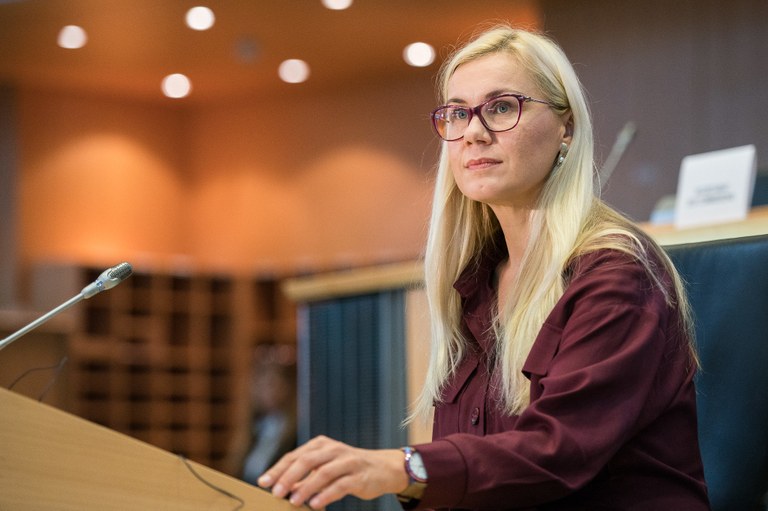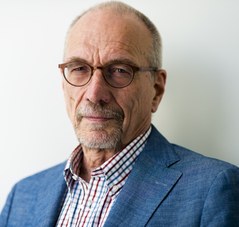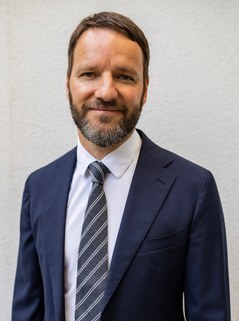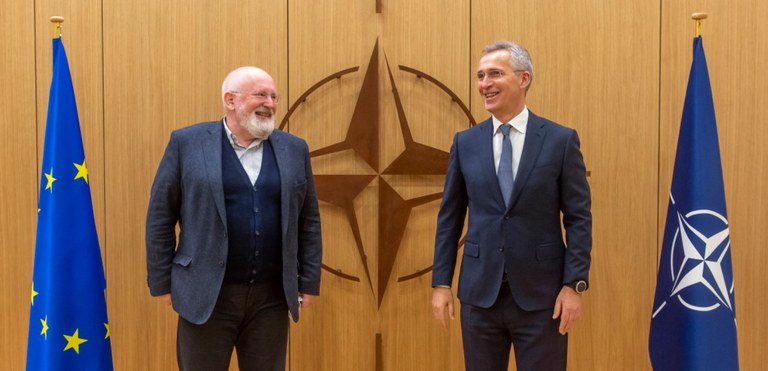The hole that must be filled: the energy crisis and EU's green transition
There had never been so much money for the green transition in Europe as there was in February 2022. But then Russia started its war against Ukraine. Europe answered by cutting the import of gas and other fossil fuels from Russia. How will this impact on the green transition? Will it speed up or must someone pull the emergency brake? The answer might be both.
During the first months of 2022, the EU’s plans for the green transition seemed to be mostly in place. The EU initiative The Green Deal, the new Climate Law and the post-corona pandemic recovery fund had all been agreed, all focusing on creating a more environmentally friendly society.
But then Russia invaded Ukraine, and the opportunities for the green transition suddenly changed. The need to free EU countries from their dependence on Russian gas became an urgent and important issue in all EU member states.
Important milestones for a green transition
We will return to how the Ukraine war might impact on the ambitious aim of a carbon-neutral EU by 2050, and the interim target of cutting emissions by 55% by 2030. But let us first rewind and remind ourselves about a few milestones on the road to a green transition.
In December 2019, the EU Commission presented The Green Deal – a strategy to reach ambitious climate targets and to introduce major measures for a just transition. Soon after, the pandemic broke out and more EU funds were needed for a recovery fund which also focused on the need for a green and just transition.
A historic deal was reached in the spring of 2021, when the European Council, the EU Commission and the European Parliament agreed on the so-called Climate Law. This is the framework for creating concrete legislation in different areas. To a large degree, this is about improving and expanding the Emissions Trading System (ETS).
The labour market is the key to the green transition
The green transition will have major consequences for the European labour market. The labour market is the key to its success, according to Swedish MP Jytte Guteland, who was the parliament's main negotiator on the Climate Law.

Jytte Guteland was the EU Parliamen's main negotiator on the Climate Law. Photo: Anders Löwdin.
“We must make sure we have the right training and skills in the sectors that are facing changes. We must also create good working conditions in the new jobs so that people are willing to carry out the transition.
“If we are too slow or do not set out our path clearly enough, we risk losing small and medium-sized companies in particular. The large car manufacturers, for instance, already have plans to go electric and build new models, but for subcontractors, this might become a problem,” she says.
As the green transition was presented, the Just Transition Fund was also launched. Its aim is to make the workforce more positive to make the change. Jytte Guteland says the idea behind the fund is reminiscent of how Sweden’s social security system is constructed.
“The fund aims to give incentives to both companies and wage earners to make changes. They will be offered the right training for the new jobs and an opportunity to get by if their jobs disappear. A just transition is close to our heart as a group. We will now look into how to improve this fund,” says Jytte Guteland.
Leave no one behind in the climate fight
The EU Commission also considers a fair transition to be a very important issue. This was made clear by Estonian Commissioner Kadri Simson in a speech to the COP26 climate summit in Glasgow last November.
“If the only livelihood you or generations of your family have ever had is based on fossil fuels, then the transition could be a rather frightening prospect. We believe that the just transition is a key issue of the climate fight: we must leave no one behind. We will mobilise up to 75 billion euros to help regions affected by the coal exit,” said Kadri Simson.

Kadri Simson from Estonia is the EU Commissioner for Energy. Photo: EU Parliament.
At the same time, businesses in several sectors have already taken the issue into their own hands and started a transition to a fossil-free future because it is obvious to them that this is where the new business opportunities lie.
Businesses increasingly eager
This is something Nils Torvalds has taken note of. Since 2010 he has been an MEP for the Swedish People’s Party, one of five government parties in Finland. He sits on the EU Parliament’s Committee on the Environment and has an important role as a climate negotiator for the liberal Renew group.
 “Considering what industry lobbyists would tell me just over ten years ago, a lot has changed. They used to tell us to take it easy, but now businesses often signal for us to ‘go on, we are ready’.”
“Considering what industry lobbyists would tell me just over ten years ago, a lot has changed. They used to tell us to take it easy, but now businesses often signal for us to ‘go on, we are ready’.”
So they want more intervention?
“Yes, and that is super interesting. They see that the faster we progress, the better their chances of competing on the global market.”
Nils Torvalds therefore believes the labour market's transition will be less painful than what has been the case for the transport and construction industries. When it comes to the heating of houses, he envisages particularly difficult problems. Nevertheless, he believes the Nordic countries have a head start compared to the rest of the EU.
“Both Sweden and Finland have remote heating systems, which means it is easy to stop using fossil fuel. But visit a house in Brussels or anywhere in Central Europe and you find individual boilers in each flat. These countries face an enormous challenge phasing out coal and gas as a heating source.”
Here too a “fund solution” is being debated. The "social climate fund" is aimed at the construction and transport sectors.
Union support for EU’s new attitude to transition
Trade unions have welcomed the green transition and the measures are viewed as a welcome change to the EU institutions’ crisis management.
 “There has never been more money in the EU coffers to support the green transition. The Just Transition Fund is a good example of how to distribute EU resources to regions that will struggle the most to manage the transition,” says Carl-Albert Hjelmborn, Director at Brussels Office of the Swedish Trade Unions.
“There has never been more money in the EU coffers to support the green transition. The Just Transition Fund is a good example of how to distribute EU resources to regions that will struggle the most to manage the transition,” says Carl-Albert Hjelmborn, Director at Brussels Office of the Swedish Trade Unions.
He adds that this is in marked contrast to how EU leaders handled the 2008 financial crisis.
“Back then, the EU troika demanded savings through cuts to wages and budget deficits. The result was mass unemployment which we still see the effects from. This time we see an opposite approach, with an emphasis on keeping companies afloat because people need to keep their jobs.
“They have even been prepared to lend money for this. It is a completely different crisis management policy and something that was unimaginable in 2008,” says Hjelmborn.
Robert Renée Hansen, head of the Brussels office for the Norwegian Confederation of Trade Unions, notes that not everyone is as positive about the green transition as we are in the Nordics, however.
“Our colleagues especially in Central and Eastern Europe are far more sceptical to the green transition process than we are, and also have less trust in authorities. They have a different history and are more sceptical to the state – for good reasons.
“The financial crisis is fresh in their minds, for instance, when the workers were left with the bill. So there is a fear among trade unions that the same thing will happen to the cost of the green transition. The Polish trade union movement lacks trust, and is against the EU’s climate measures,” he says.
The war means more desire for quick change
How will Russia’s war in Ukraine influence the EU’s work towards a green transition? The EU Commission was quick to issue a plan for reducing the import of Russian gas by two thirds as early as this year, before getting rid of the dependence on Russian fossil fuel altogether by 2030.
“We have been far too dependent on Russia, but we will now go for renewable energy that is clean, cheap and ours, and it will also create new jobs here in Europe,” the EU Commission’s First Vice President Frans Timmermans told a press conference at the EU Parliament in Strasbourg on 8 March this year, as the so-called Repower strategy was presented.

The EU Commission's Fist Vice President Frans Timmermans has also had close contact with Nato Secretary-General Jens Stoltenberg after Russia invaded Ukraine. Photo: Nato.
The strategy is partly built on increasing investments in major solar and wind power projects and partly on replacing Russian gas with gas from elsewhere during a transition period. There is talk about pausing the decommissioning of coal and nuclear power for a while. The EU Commission also encourages citizens to contribute by saving energy.
The Commissioner for Energy Kadri Simson told the same press conference that the application process for building wind power plants must be accelerated. She therefore announced a proposal for member states to speed up authorisations. Today it could take seven years just to get permission to start construction, she pointed out.
Different expectations among MEPs
So what do EU parliamentarians think about the war’s impact on the green transition?
“The war forces us to act faster. But it can also mean that Polish coal mine workers can keep their jobs for a while longer,” says Nils Torvalds.
“It can go both ways,” says Jytte Gutenland, but adds that the war might have improved the awareness of what is needed.
“The same happened at the beginning of the pandemic when people said it will impact on our ambitious climate measures. But we managed to pass them. We underestimated how much insight people had. We might be in a similar situation now. The crisis motivation could become a drive for a climate transition. Many of those who did not listen before now see that they do not wish to contribute to Putin’s war chest.”
Other MEPs we speak to have different levels of expectations. Malin Björk from the Left Party in Sweden fears many countries will now finance their armies instead, and uses Germany as an example.
"Germany is pouring 100 billion euro into defence. They should go for renewables instead. That might be the best way of stopping Putin. The risk is that there is not enough focus on renewables," she says.
The Swedish Moderates want to go for nuclear power.

"What we need now is great investment in both defence and the green transition. If the EU is to become less dependent on Russian gas, we have to pay. We also need to look at the alternatives and stop the decommissioning of nuclear power," says Moderate Tomas Tobé.
Danish Social Democrat Marianne Vind disagrees and says:
“We want to be free from Russian gas and go for alternative energies like solar, wind and hydro. We can discuss the be or not to be of nuclear power as much as we like. I hope we can avoid it. It is an expensive solution.”
- Large dimensions
-
The picture above was taken onboard the pipelay Castoro Sei as the first Nord Stream pipeline was installed in 2011. Two parallel gas pipelines with the capacity to transport 55 billion cubic metres of natural gas per year, deliver Russian gas to Europe.
Another two parallel pipelines have been installed and were due to be opened just as Russia invaded Ukraine. The capacity would have increased to 110 billion cubic metres.
 Follow us on Facebook
Follow us on Facebook
